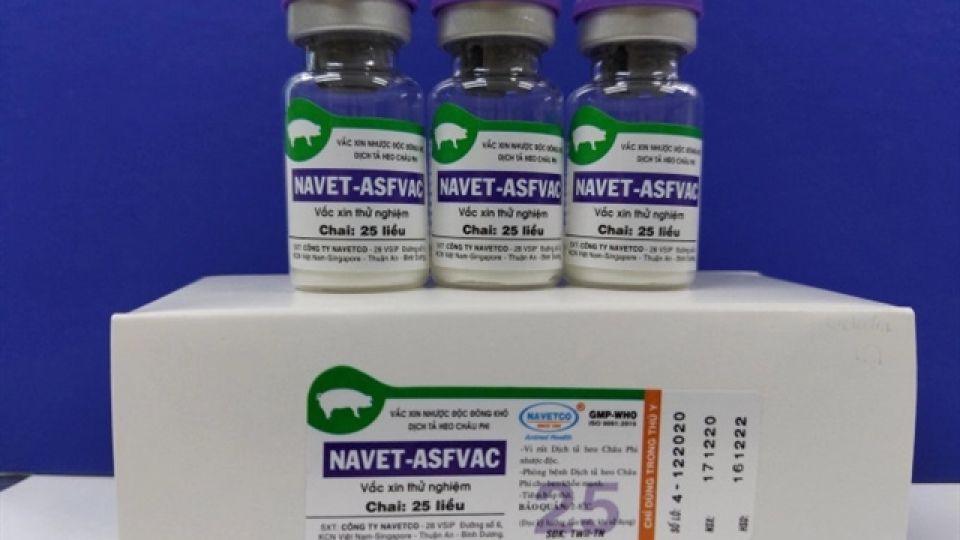June 3, 2022
HÀ NỘI — Việt Nam has become the first country to develop a commercial vaccine against African swine fever which meets technical requirements and ensures sterility, safety and potency with an immunity length of six months, the Ministry of Agriculture and Rural Development has announced.
This is a breakthrough event for Việt Nam’s husbandry sector as there is no effective commercial vaccines against the disease yet.
Speaking at a press conference on Wednesday, Deputy Minister of Agriculture and Rural Development Phùng Đức Tiến said the successful production of a vaccine against African swine fever would contribute to the development of domestic livestock and export overseas.
“We can confidently produce vaccines against African swine fever to meet the domestic demand and export the vaccine overseas. So far, no country has announced success in commercial vaccine production,” he said.
“The potential of exporting African swine fever vaccines produced in Việt Nam to other countries is huge,” he added.
The trade name of the published vaccine is NAVET-ASFVAC, a product of Navetco National Veterinary Joint Stock Company.
It is expected that the ministry will officially issue a circulation license on Friday (June 3).
Tiến said since the outbreak of African swine fever, scientists around the world have published more than 4,000 studies on the disease itself, as well as vaccine development. However, there is no commercial vaccine in the world available to prevent African swine fever.
The research and production of African swine fever vaccines faced many difficulties and challenges around the world in previous years, such as a limited understanding of viruses, infection mechanisms, birth mechanisms, and difficulties in finding the right cell culture lines to be able to produce commercial vaccines in large quantities.
Nguyễn Văn Long, Acting Director of the ministry’s Department of Animal Health, said in early November 2019, the US had successfully developed a genetically altered African swine flu virus to facilitate vaccine production.
This was a very important step for the research and production of vaccines against African swine fever. In November 2019, the ministry sent leaders of the Department of Animal Health to the United States to discuss cooperation in developing a vaccine in Việt Nam.
In February 2020, the ministry directed the Department of Animal Health to sign a joint technical cooperation agreement with the Agricultural Research Institute under the US Department of Agriculture.
Five months later, the ministry allowed the import of the genetically modified prior strain of the African swine fever virus for vaccine production. Navetco National Veterinary Joint Stock Company finished the pilot programme on 72 pigs in normal conditions with a 100 per cent success ratio.
The vaccine was developed from a genetically modified prior strain of the virus by deleting a previously uncharacterised gene, I177L.
The ministry has established scientific councils at many levels and organised meetings with leading scientists in Việt Nam, managers and producers of veterinary vaccines to carefully evaluate reports on scientific research results and registration dossiers for circulation of the African swine fever vaccine NAVET-ASFVAC of Navetco Company.
“The vaccine research and production results, after being thoroughly evaluated by independent scientists, have been accepted and published in the world and Việt Nam’s prestigious scientific journals,” Long said.
On May 17, the Agricultural Research Institute under the US Department of Agriculture sent an official letter to the Department of Animal Health of Việt Nam, confirming the NAVET-ASFVAC vaccine ensures safety and effectiveness.
Trần Xuân Hạnh, Deputy General Director of Navetco Company, said that the vaccine price is estimated to range from VNĐ34,000 to 36,000 per dose, equivalent to the vaccine against blue ear disease.
African swine fever is a contagious and deadly viral disease affecting swine of all ages. The disease was first detected in Việt Nam in February 2019 before it spread to all 63 cities and provinces in the country seven months later, forcing the nation to kill around six million pigs, or 20 per cent of the total hog herd. — VNS


